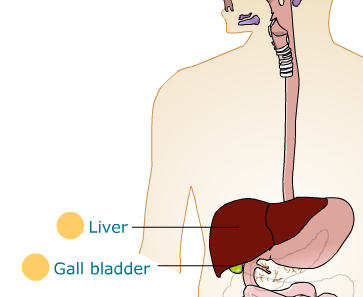The liver
The liver is one of the most important organs in the body, performing more functions than any other.
Its main functions in connection with digestion are these:
- It produces a complex liquid called bile which contains substances needed for certain digestive processes. This is stored in the gall bladder, as we'll see later.
- It regulates the amount of sugar in the blood by releasing glucose as necessary.
- It is an important site for the metabolism of carbohydrates, proteins and fats.
- It synthesizes amino acids from simpler compounds, and removes excess amino acids.
- It stores fats, iron, and vitamins A, D, E and K.

